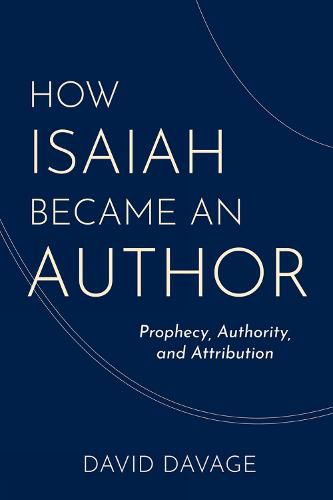Readings Newsletter
Become a Readings Member to make your shopping experience even easier.
Sign in or sign up for free!
You’re not far away from qualifying for FREE standard shipping within Australia
You’ve qualified for FREE standard shipping within Australia
The cart is loading…






Traditionally, biblical studies has been an academic discipline with roots deeply embedded in historical inquiries about the genesis of texts. It should come as no surprise that a significant amount of scholarly attention has been on the formation of the book of Isaiah, especially since the compelling imagination of Isaiah comprises an anthology of prophetic voices, each with its own historical context. At the same time, it is well known that the chasteness of ancient texts discloses precious little specific information to aid with this reconstructive task.
How Isaiah Became an Author tackles this historical irony head-on. David Davage begins by describing two contrasting ways authorship was conceived in antiquity: Mesopotamian and Greek. He next analyzes the processes through which Isaiah ben Amos came to be imagined as an author of the book of Isaiah. In doing so, Davage changes the question from Who wrote the ‘book’ of Isaiah? to How, and in what ways, was the relation between the prophet called Isaiah and the book that came to bear his name conceived in the Second Temple period?
Davage shows how a prophetic anthology that originally circulated anonymously eventually became transmitted together with a name. Although that name originally did not convey any notion of penning, but rather portrays Isaiah ben Amos as a tradent of divine revelation transmitted by many agents over time, it came to be reimagined as a statement about the origins of the book. This transformation is, then, explained as the result of negotiations between the Mesopotamian and the Greek author concepts in the late Second Temple period, negotiations that have continued even to this day.
$9.00 standard shipping within Australia
FREE standard shipping within Australia for orders over $100.00
Express & International shipping calculated at checkout
Stock availability can be subject to change without notice. We recommend calling the shop or contacting our online team to check availability of low stock items. Please see our Shopping Online page for more details.
Traditionally, biblical studies has been an academic discipline with roots deeply embedded in historical inquiries about the genesis of texts. It should come as no surprise that a significant amount of scholarly attention has been on the formation of the book of Isaiah, especially since the compelling imagination of Isaiah comprises an anthology of prophetic voices, each with its own historical context. At the same time, it is well known that the chasteness of ancient texts discloses precious little specific information to aid with this reconstructive task.
How Isaiah Became an Author tackles this historical irony head-on. David Davage begins by describing two contrasting ways authorship was conceived in antiquity: Mesopotamian and Greek. He next analyzes the processes through which Isaiah ben Amos came to be imagined as an author of the book of Isaiah. In doing so, Davage changes the question from Who wrote the ‘book’ of Isaiah? to How, and in what ways, was the relation between the prophet called Isaiah and the book that came to bear his name conceived in the Second Temple period?
Davage shows how a prophetic anthology that originally circulated anonymously eventually became transmitted together with a name. Although that name originally did not convey any notion of penning, but rather portrays Isaiah ben Amos as a tradent of divine revelation transmitted by many agents over time, it came to be reimagined as a statement about the origins of the book. This transformation is, then, explained as the result of negotiations between the Mesopotamian and the Greek author concepts in the late Second Temple period, negotiations that have continued even to this day.